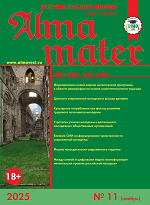UDC 37.09:81`24
https://doi.org/10.20339/AM.03-23.097
Svetlana N. Rybkina, Candidate of Philological Sciences (Ph.D.), Docent, Аssistant Professor of Department of Foreign Languages and Intercultural Communications at Ural State University of Railway Transport, e-mail: swrybkina@mail.ru
The article is devoted to the search for ways to optimize the speech skills of students in the conditions of polyglossia and limited amount of teaching hours devoted to the study of foreign languages in modern non-linguistic universities. The situation of learning foreign languages in these conditions determines the relevance of addressing this topic. From the author's point of view, the effectiveness of the direct method, which is dominant in non-linguistic universities, is limited by a number of factors, which include, first of all, an acute lack of study time, a limited ability to accumulate cognitive-linguistic experience, and the lack of the opportunity to acquire translation skills necessary in the professional field. One of the ways to optimize the foreign language speech skills of students, according to the author, is to supplement the arsenal of means of the direct method with methodological techniques of the activity approach — primarily such as reflection, analysis and comparison of speech works in different languages, including the native one, the dosed use of the native language, as well as the use of translation as one of the ways to identify the specifics of speech in a foreign language. The author comes to the conclusion that the use of these techniques will help prevent interference, accumulate cognitive-linguistic and sociocultural experience necessary for the successful learning of languages in conditions of polyglossia, and also create the basis for acquiring translation skills in the professional field by students of non-linguistic universities.
Keywords: polyglossia, speech skills, methods of learning foreign languages, non-linguistic universities, Russian language, German, English.
References
- Bashilova, E.I. Computer technologies and study of a foreign language. Modern scientist. 2021. No. 2. P. 35–38.
- Grünewald, A. Multimedia im Fremdsprachenunterricht. Peter Lang Verlag , 2006. 344 s.
- Demesinova, F.B. Benefits of using Internet resources in an English lesson. Young scientist. 2021. No. 14 (365). P. 121–125.
- Klochko, K.A. Experience of gamification of educational process in order to develop foreign language communication skills. In: Foreign languages in the context of culture. Interuniversity Digest of articles based on the materials of the conference (24.10.2020). Perm, 2020. P. 96–101.
- Imlig-Iten, N. Lernen mit digitalen Lernspielen im Unterricht. Einfluss von angebots- und nutzungsspezifischen Faktoren. Universität Zürich, 2019. 79 s.
- Zimnyaya I.A. Psychological aspects of teaching speaking in a foreign language. Moscow: Education, 1978. 159 p.
- Rybkina S.N. On the issue of choosing a methodology for studying foreign languages. Modern problems of science and education. 2020. No. 5. URL: http://www.science-education.ru/article/view?id=30187 (accessed on: 10.15.2020).
- Shcherba, L.V. Teaching foreign languages in high school. General questions of methodology. Moscow: Vysshaya shkola, 1974. 112 p.











.png)






